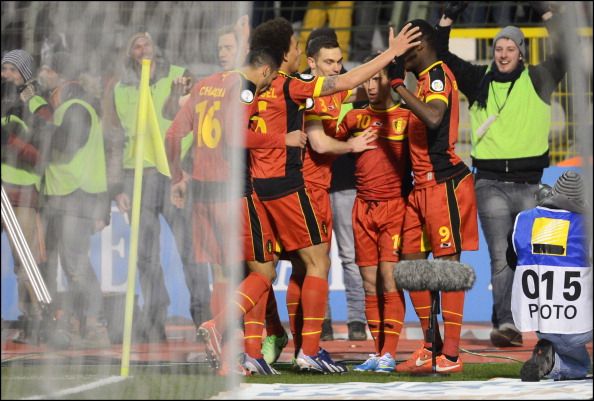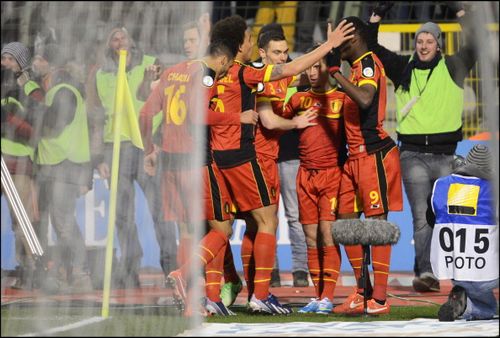
A look at Belgium’s golden generation

Belgium – On the rise
The rise of Belgium football in the last 18 months or so has been so much that it’s impossible to have a conversation about international football without falling over the potential and performances of the Diables Rouges.
Friday’s 2-1 win over Croatia secured them a top spot in their qualifying group and a place at the World Cup for the first time since 2002, which makes it a perfect time to see whether Belgium really are a threat to the giants of international football.
The Red Devils have never been a contender among the European nations. They have only qualified for the one of the last seven European Championships. They failed to reach the last two World Cup Finals and have only progressed further than the Round of 16 once. But at next summer’s World Cup, however, the Belgians are one of the nations to watch out for. A dark horse that will surprise and shock many people with their progress.
In the past few years, Belgium football has changed immensely. Between March, 2009 and September, 2010, they lost 11 of their 16 matches. Their only competitive victory was a 2-0 win over Turkey in a World Cup qualifier, which they failed to reach the final tournament in South Africa. Since the departure of unsuccessful managers Franky Vercauteren and Dick Advocaat, this Belgium squad has become a prominent force in Europe. They have won eight of their last ten matches and are still unbeaten in 2013. Their last competitive loss was back in October 2011, when they were defeated 3-1 away from home by Germany in a Euro 2012 qualifier.
When a team has such an improvement in form like the Diables Rouges have had, there generally has to be a point from which the improvement starts. Many people believe that for Belgium, it was the 2008 Summer Olympics in Beijing. Even though they finished fourth, losing semi-finalists behind Argentina of Lionel Messi and Sergio Aguero, midfielder Marouane Fellaini told Esquirethat it was the beginning of the Belgian revolution.
“One thing is we have played together for a long time. A lot of us went to the Olympics in Beijing, stayed together in the village, when we were 18, 19, 20, 21, so we got to know each other very well, and we had a good tournament. So that was maybe the start of it. But I guess also it is luck that this has happened.”
A quick look at that Olympics squad reveals some very popular names. A 22-year-old Hamburg defender Vincent Kompany. Thomas Vermalen and Jan Vertonghen, 22 and 21-year-old respectively, both playing for Ajax. Standard Leige’s 20-year-old midfielder, Fellaini. There’s more. Sebastien Pocognoli, Maarten Martens, Kevin Mirallas and Mousa Demebele. At least seven or eight players that now play for the senior side on a regular basis. It looks like familiarity formed the core of the Belgium side, which has assured them success. Familiarity isn’t the only secret to the Diables Rouges’ recent success. As any Premier League fan will know they also have an overwhelming array of talent across the pitch.
In defence, they boast the captains of two top English clubs, Arsenal and Manchester City, in Vermaelen and Kompany. Along with them, they have Bayern Munich’s experienced centre-back Daniel Van Buyten, while Vertonghen, Tottenham Hotspur’s best player last season after Gareth Bale, has been filling in at left-back with Atletico Madrid’s summer signing Toby Alderweireld at right-back. That’s without even considering the pair of keepers that will marshal the back four. Liverpool’s inform Simon Mignolet provides experience and talent, but he can’t oust Thibaut Courtois between the sticks. The Chelsea loanee has conceded just three goals in nine qualifiers and is performing very well for Atletico this season, too.
The midfield is another embarrassment of Premier League riches, with a duo of world class Chelsea stars. The gifted up-and-coming Kevin De Bruyne along with the highly talented, skillful and already among one of Europe’s best Eden Hazard. Joining the force in the middle of the park is the power and strengthn of Dembele and Fellaini. Along with the technical ability of Zenit St Petersburg’s Axel Witsel and the experience of Timmy Simmons. There is no doubt, Belgium have one of the most feared midfields in international football.
In front of these stars, the Red Devils can also boast the likes of Mirallas, Nacer Chadli and Dries Mertens on the wings. And then, there is a pair of strikers that Premier League fans will be all too familiar with. Christian Benteke single handedly kept Aston Villa in the Premier League last season by scoring 19 goals in his debut season. And if Benteke is not the man to be feared, then there is Romelu Lukaku, who has already made an impressive start to his loan spell at Everton. The duo managed a total of 36 goals last season, and one can only imagine how fruitful their contributions are going to be in Brazil.
The most impressive aspect of Belgium’s squad is the amount of quality they have beyond their first team. Zenit star Nicolas Lombaerts and Standard Leige’s Jelle Van Damme can ease into the first team’s defence whenever needed. Steven Defour, Radja Nainggolan and Thorgan Hazard, the younger brother of the Chelsea star, all offer something different to the team, allowing the manager to change his formation when necessary. And then there are Jelle Vossen and Igor de Camargo as cover for Benteke and Lukaku if needed.
Belgium currently have a perfect blend of youth and experience in their squad, and manager Marc Wilmots provides the much needed stability. Although only in charge of the first team for over a year, he is a very down to earth man and has been in the international setup since 1986, when he played for the Under-19 side. If there is one man who knows these players and how to get the best out of them, it is Wilmots.
The World Cup Finals in Brazil kick off in less than eight months. Currently, the bookmakers rate Belgium, who are ranked sixth in the world ahead of Netherlands, England and Portugal, as the fifth favourite team to lift the trophy (via paddypower.com), behind Brazil, Argentina, Germany and Spain. Suggesting that the Diables Rouges might go all the way might be a step too far, particularly at a South American tournament, but they have the quality in them so don’t be too surprised or shocked if they end up outperforming their fellow European nations.
Everything is in place for Belgium to emerge as the next footballing superpower following in the footsteps of Germany, Brazil and Spain. The upcoming World Cup in Brazil may be out of reach, but with the invaluable experience their players will gain from participating in such a major tournament along with the benefits of having lived and played together as a team for a longer time, they have to be considered as one of the favourites to win the Euros in 2016.